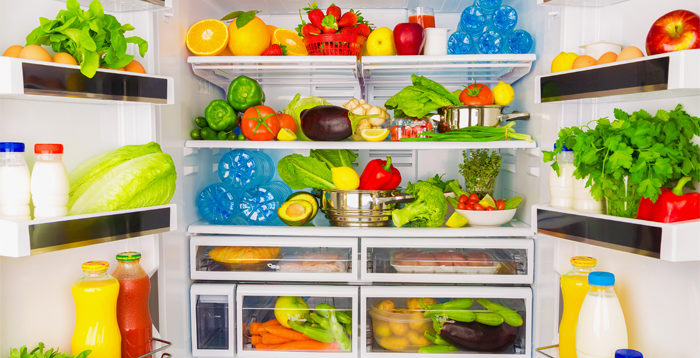12 Food Storage Tips to Make Your Groceries Last Longer

We’ve all been there before — tossing fuzzy raspberries, wilted parsley, and mushy apples into the trash bin with a heavy heart thanks to subpar food storage.
It’s all too easy to forget about your groceries until they start stinking up your kitchen, but here’s the good news: knowing how to store them properly isn’t rocket science.
Not only does proper food storage prevent unnecessary waste (and sudden bouts of frustration), but it also lessens your grocery bill and minimizes the risk of contracting a food-borne illness.
12 Food Storage Tips to Help Your Food Last Longer
These 12 simple food storage tips will help ensure your food stays fresh as long as possible.
Store dairy products at the back of the fridge
Take your jug of two-percent out of the fridge door. That location might make it easy to grab quickly for your bowl of cereal, but it might make it spoil faster because of the temperature.
It’s crucial to keep your dairy products at the back of the fridge where it’s coldest, says Ani Aratounians, R.D.
Put meat on the bottom shelf
Nothing ruins a container of broccoli faster than a soak in pork juice. “Meats should be on the bottom shelf so juices don’t drip on other foods,” Aratounians explains.
If you’re out of precious lower shelf space, put the meat in a tray with a raised lip to catch any liquid that might try to escape. She also advises keeping cold cuts separate from other raw meat to prevent cross-contamination.
Treat herbs like flowers
Fresh herbs, asparagus, and green onions can all be stored upright in a tall glass of fresh water. Just trim the stems, cover them with a bit of plastic wrap, and place them in the fridge.
Know where to store fruits and vegetables
Not all fruits and veggies need to live in the fridge. Avocados, citrus, bananas, nectarines, pears, peaches, onions, tomatoes, and potatoes can all be stored at room temperature or in a cool pantry.
But don’t store onions and potatoes together. Because of ethylene gas that some kinds of produce release, they cause each other to spoil faster.
Wrap your greens in paper towels
To prevent slimy residue from accumulating in your bag of lettuce, spinach, or other leafy greens, stick paper towels inside to soak up excess moisture. You can do the same with leftover salad greens in food storage containers.
Use plastic wrap on bananas
Cover the crown of a bunch of bananas in plastic wrap to slow the release of ethylene gas. This will prevent them from ripening too quickly if you’re not going to use the whole bunch right away.
But even if you find yourself with some bananas that are past their prime, that doesn’t mean you have to toss them into the trash. There are a number of tasty recipes that call for overripe bananas.
Wrap celery in foil
Wrapping the entire bunch of celery in foil helps it stay fresh and crunchy for up to four weeks in your crisper drawer. The foil helps to keep just the right amount of moisture in, and the ethylene gas out.
Wash produce as you go
If washing fruits and veggies is thirst thing you do when you come home from the grocery store, you might want to switch up your routine. Unless you plan on freezing your food, Aratounians advises only washing things you’re ready to eat right away or soon after. That lessens the chance of mold growing on damp produce. And if you’re going to chop up your food in advance to save time, just wait to wash it right before you eat it.
Soak berries in vinegar
If you don’t eat all the berries right away, a quick soak in a three-parts water, one-part vinegar solution will kill bacteria and prevent molding. Rinse the berries thoroughly then pat dry once you’re done.
Roast veggies
Nutritionist Jodi Geigle recommends roasting vegetables such as broccoli and cauliflower to extend their shelf life.
“It’s also a great meal prep tip to have cooked veggies on hand that you can quickly throw in as an addition to any meal,” Geigle says.
Store grains in air-tight containers
Buying in bulk is a great way to save money when grocery shopping, but you want to store it correctly so the extra food doesn’t go to waste. “If you buy grains in bulk, be sure to transfer them to an airtight container to maintain freshness, as well as keep bugs away,” says Aratounians.
Go a step further and label your containers with the purchase dates so you know how long you’ve had your grains.
Double-check your fridge’s temperature
Finally, after you’ve wrapped and placed all your perishables in the refrigerator, be sure that it’s set at the right temperature. “Make sure your fridge thermometer is working correctly to prevent spoilage and reduce the risk of food-borne illness,” says Geigle.
The temperature should be set to at least 40 degrees Fahrenheit (five degrees Celsius), or a few degrees lower.

